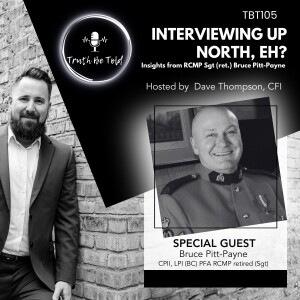
Wednesday Mar 13, 2024
Interviewing Up North, Eh? Insights from RCMP Sgt (ret.) Bruce Pitt-Payne
In this episode, Dave Thompson interviews Bruce Pitt-Payne, a former major crime investigator with the Royal Canadian Mounted Police (RCMP), about the evolution of interviewing techniques. They discuss the shift from confession seeking to information gathering, the benefits of recording interviews, and the challenges of implementing change in the field. They also explore the Mr. Big technique used in undercover operations and the importance of rapport and vulnerability in interviews. The conversation highlights the phased interview model and the PEACE model as effective frameworks for conducting interviews. In this conversation, Bruce Pitt-Payne and Dave Thompson discuss various aspects of interviewing and communication strategies. They explore the different behaviors of interviewees and how to navigate them effectively. They also emphasize the importance of following scientific principles in communication and avoiding biases and prejudices.
Truths:
- The shift in interviewing techniques from confession seeking to information gathering has led to more effective and ethical interviews.
- Recording interviews is crucial for accuracy, transparency, and accountability.
- Understanding vulnerability and adapting to the individual being interviewed is essential for building rapport and obtaining reliable information.
- Implementing change in interviewing techniques can be challenging due to resistance and the need for continuous learning.
- The phased interview model and the PEACE model provide effective frameworks for conducting interviews.
- Different interviewees may exhibit different behaviors, such as remaining silent, judging the interviewer, or trying to manipulate the conversation.
- It is important to recognize and respect an interviewee's right to choose whether or not to speak.
- Following scientific principles in communication is crucial, as anecdotal evidence may not represent best practices.
- We are all biased and prejudiced to some extent, so it is important to be aware of our own biases and strive to minimize their influence in the interview process.
No comments yet. Be the first to say something!